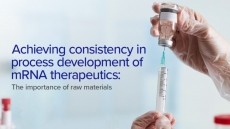Cobra to supply plasmids to UK COVID-19 vaccine developer

The agreement with Cobra covers Good Manufacturing Practice (GMP) production of plasmid DNA needed to generate the DNA vaccine, against SARS-CoV-2, for use in a Phase 1 clinical trial in 2021 (COVIDITY).
That works begins immediately, said a spokesperson for Cobra Biologics.
“Our collaboration with Cobra is critical to us moving forward with our novel SARS-CoV-2 vaccine into the planned Phase 1 clinical trial, COVIDITY. Cobra has the expertise needed to produce clinical grade plasmid at scale and we look forward to working with them to advance our vaccine and demonstrate its potential effectiveness and protection against COVID-19,” said Dr Cliff Holloway, CEO of Scancell.
Long-lasting protection
Scancell develops novel immunotherapies for the treatment of cancer and infectious disease.
Its DNA vaccines are designed to target dendritic cells to stimulate high avidity T cells that identify and destroy diseased cells. It believes its proven technology platform can produce a simple, safe, cost-effective and scalable vaccine against COVID-19 that induces both durable T cell responses and virus neutralizing antibodies (VNAbs).
It said the DNA vaccine will target the SARS-CoV-2 nucleocapsid (N) protein in addition to the key receptor-binding domain of the spike (S) protein to generate both T cell responses and VNAbs against the SARS-CoV-2 virus.
“The N protein is highly conserved amongst coronaviruses; therefore, this new vaccine has the potential to generate protection not only against SARS-CoV-2, but also against new strains of coronavirus that may arise in the future.”
Consortium behind vaccine development
Scancell announced in August that it had been granted funding by Innovate UK to progress a COVID-19 vaccine. It is collaborating with the University of Nottingham and Trent University in a consortium on the project.
Set to receive around £2m (US$2.6m) of the consortium awarded funding, Scancell expects those monies to cover the majority of the development and Phase 1 trial costs, which is on track to be conducted next year.
A spokesperson for Scancell outlined the various roles of the partners in the COVIDITY project for us:
“The consortium is being led by Professor Lindy Durrant, Scancell’s chief scientific officer, with Prof Durrant and Scancell’s development director, Dr Sally Adams, coordinating activities towards initial clinical evaluation of the vaccine.
“Virologists at the University of Nottingham’s Centre for Research on Global Virus Infections have identified parts of the coronavirus SARS-CoV-2 that they hope will generate an immune response to prevent infections that have caused the COVID-19 pandemic. This information is being used by Scancell to design DNA-based vaccines that allow easy and effective delivery of the vaccine into humans and the development of protective antibody and T cell immune responses.
“Scientists at the new University of Nottingham’s Biodiscovery Institute (BDI) are formulating the vaccine as peptide nanoparticles to be delivered efficiently with a simple injection.
“Nottingham Trent University’s John van Geest Cancer Research Centre will screen the new vaccine for its capacity to trigger immune responses against SARS-CoV-2, prior to the new approaches being tested in healthy volunteers.”
In terms of what happens between now and the start of the Phase 1 clinical trial, the spokesperson said that the selected plasmid DNA and the peptide nanoparticles have to be manufactured in compliance with regulatory GMP guidance, tested for responses in animals and a regulatory submission made to the authorities to allow the study to go ahead.


















